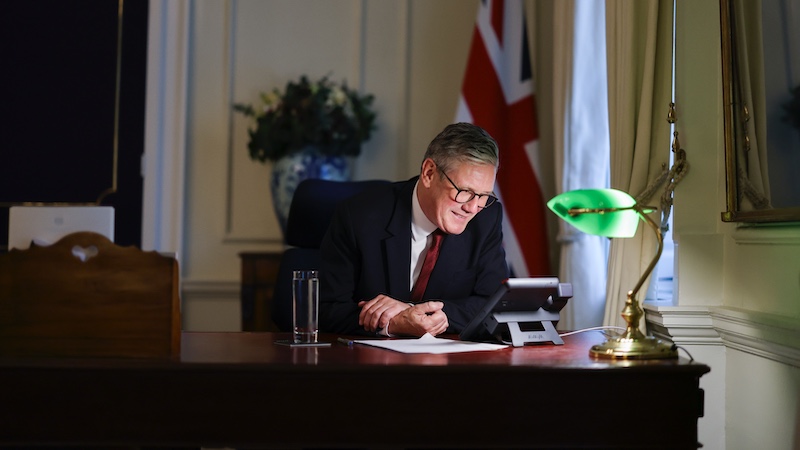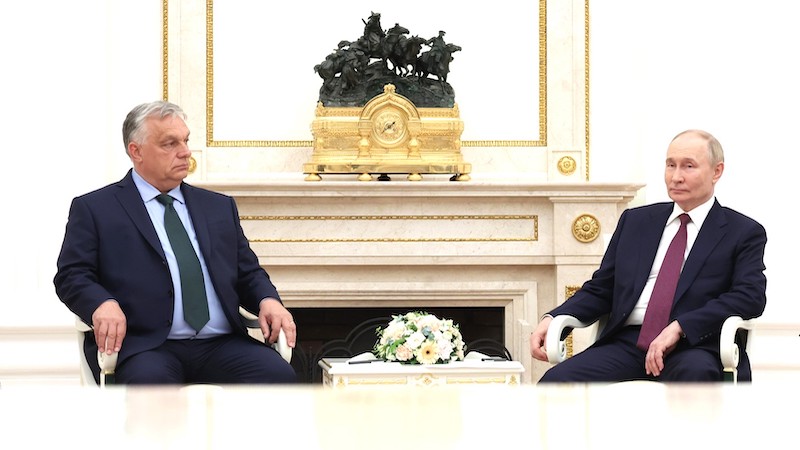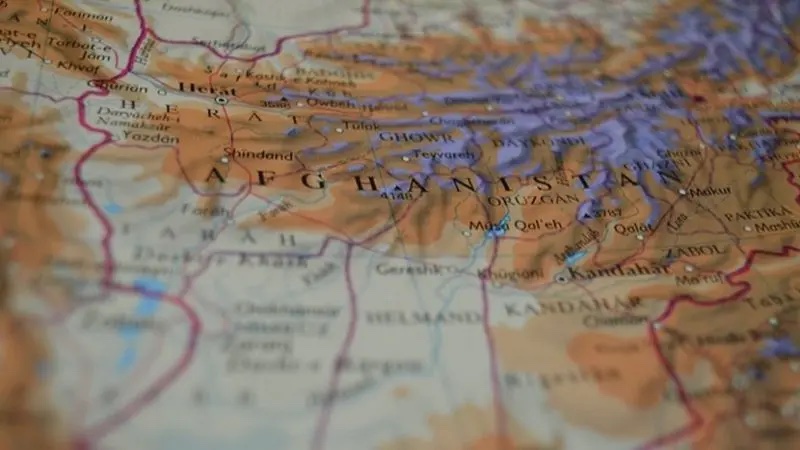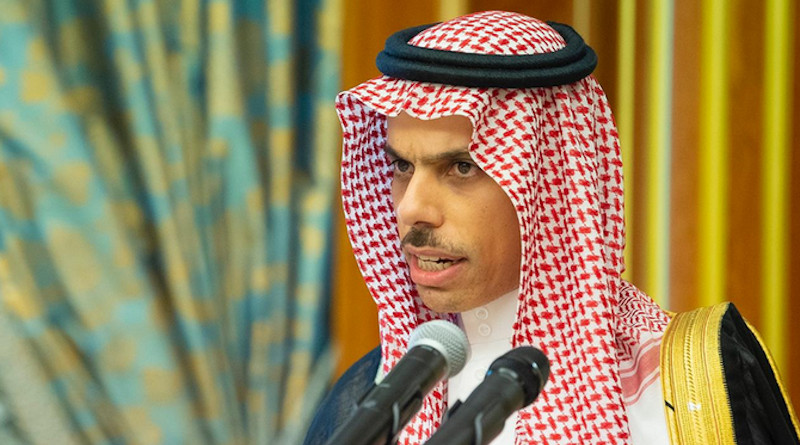Day: July 5, 2024
NPR News: 07-05-2024 7PM EDT

(RFE/RL) — A triumphant Keir Starmer announced in London early on July 5 that “change begins now,” after his Labour Party scored a landslide victory to end 14 years of Conservative government in the United Kingdom’s general elections a day earlier.
But while new Prime Minister Keir Starmer and his center-left party have pledged a fresh approach to British economic woes and a cost-of-living crisis at home, they have signaled no dramatic break with the outgoing government’s policy of robust military and diplomatic support for Ukraine in its ongoing war to defeat Russian invaders.
In a phone call with U.S. President Joe Biden hours after taking office, Starmer said U.K. backing for Ukraine’s war effort would not be weakened under the new government.
“The leaders reiterated their steadfast commitment to Ukraine, and the prime minister underscored that the U.K.’s support for Ukraine was unwavering,” Starmer’s office said in a statement.
The two men “reiterated their continued support for Ukraine as it fights Russia’s unrelenting aggression,” the White Housesaidin a separate readout.
While Labour has hinted at a more conciliatory tone than its Conservative predecessor in relations with the European Union, the party has gone to lengths to reassure NATO and other allies helping arm Kyiv that London will continue to regard Russia as a threat to Europe.
Ukrainian President Volodymyr Zelenskiy was quick to welcome the continuity in a message of thanks to the outgoing Conservatives and congratulations to the incoming Labour government for its “convincing election victory.”
“Ukraine and the United Kingdom have been and will continue to be reliable allies through thick and thin,” Zelenskiywrote on X. “We will continue to defend and advance our common values of life, freedom, and a rules-based international order.”
He wished Starmer well in “solidifying the U.K.’s leadership on the world stage.”
“I look forward to working closely together on strengthening the Ukraine-U.K. partnership and restoring international peace and security,” Zelenskiy added.
“A mandate like this comes with a great responsibility,” Starmer, who took over Labour’s leadership four years ago, told supporters after the party’s victory was assured.
At around noon local time at Buckingham Palace, King Charles III formally launched the 61-year-old former lawyer’s tenure as prime minister by asking him to form a government.
Outgoing Conservative Prime Minister Rishi Sunak was a strong backer of NATO and other international assistance for Ukraine including the supply of weaponry.
Zelenskiy expressed gratitude in his message to Sunak and his government’s “steadfast support” and “shared achievements,” including the supplies of tanks, Storm Shadow missiles, F-16 training for our pilots, and the first bilateral security cooperation agreement” after Russia’s invasion began.
David Lammy, who was officially appointed on July 5 as foreign secretary in Starmer’s Labour government, predicted Labour’s return to power will usher in a foreign policy of “progressive realism.”
He hassaidit is time to “turn the page on 14 years of Tory chaos.”
But the resets in foreign policy that Lammy has touted among Labour’s goals involve reconnecting with Europe to repair some of the damage since Brexit, addressing climate change, and engaging more aggressively with the Global South.
On defense, Starmer and Labour have described their commitment to NATO’s foremost role in transatlantic security as “unshakable.”
On Ukraine, Labour has pledged “steadfast” military, financial, diplomatic, and political support. Labour’s manifesto also calls for helping lay out a path for Ukraine toward NATO membership.
Olivia O’Sullivan, director of the U.K. In The World Program at Chatham House, a London-based think tank, told RFE/RL that “there are many ways in which the foreign policy positions of the Labour Party are not that distinct from the Conservatives,” calling it “one surprising area of consensus in the U.K.”
“Particularly on Ukraine, the Labour Party have been at pains to emphasize that they are as staunch and as consistent in their support for Ukraine,” O’Sullivan said. “There’s very little daylight between their position and [that of] the Conservatives.”
The woman who is expected to assume the EU’s top diplomatic post later this year, Estonian Prime Minister Kaja Kallas, congratulated Starmer on his electoral victory and praised “the U.K.’s commitment to our common security.”
“I’m sure our excellent cooperation will only continue to thrive,”she addedon X.
Starmer has hinted that he would meet early in his leadership with Zelenskiy, and he has described Russian President Vladimir Putin as “the aggressor in Ukraine.”
“The most important thing is to be absolutely clear that our support for Ukraine is on a united front in this country,” Starmer said.
Starmer’s new government will immediately have a chance to test that intention at NATO’s 75th anniversary summit in Washington on July 9-11.
Soon after, Britain will host a European Political Community Summit at Blenheim Palace on July 18.
“I think one of their goals for both of those events…will be to affirm that they’re taking a very similar line through the previous government on Ukraine and on support for Ukraine,” O’Sullivan said.
She said Starmer’s challenges include fiscal restrictions and looming elections in France and the United States, either of which could deal blows to transatlantic unity.
Analysts say British voters turned to Labour seeking relief from a 14-year Conservative tenure marked by the Brexit vote in 2016 to leave the European Union and economic woes and stagnation that have followed the COVID-19 pandemic and Russia’s full-scale invasion of Ukraine.
Labour eclipsed the 326 seats needed for a working majority in the House of Commons early in the vote count that showed it gaining well over 200 seats as the Conservatives lost an even higher number of seats.
Right-wing populist Reform Party leader Nigel Farage won a seat for the first time in eight attempts, indicating that Britain was experiencing some of the right-wing surge that showed up in last month’s elections to the European Parliament.

By Alexandra Brzozowski and Charles Szumski
(EurActiv) — Hungary’s Prime Minister Viktor Orbán travelled to Moscow on Friday (5 July) to meet Russian President Vladimir Putin, only a few days after his visit to Kyiv, on a trip that earned him stern rebukes from EU officials and diplomats.
“Prime Minister Viktor Orbán has arrived in Moscow as part of his peace mission”, Bertalan Havasi, the Prime Minister’s press chief, told Hungarian press agency MTI on Friday.
“The Prime Minister will meet with Russian President Vladimir Putin”, the statement added.
This trip comes a few days after Orbántravelled to Kyiv tomeet Ukraine’s President Volodymyr Zelenskyy.
“The aim of the Hungarian presidency is to contribute to solving the challenges ahead of the European Union. That’s why my first trip was to Kyiv,” Orbán wrote on Facebook when he arrived in Kyiv on Tuesday (2 July).
Last week, the EUopened formal membership talkswith Kyiv at its summit in Brussels,giving Ukraine a morale-lifting boost, although a long and tough road still lies ahead, before it can join the bloc.
Orbán last met Putin in Beijingin October 2023at the Belt and Road Forum, where he was the only EU politician to travel.
According to Euractiv’s partnerTelex, the fact that the prime minister is meeting Putin just a few days after his visit to Kyiv, indicates that he still considers it important to maintain his relations towards Russia, which his critics considers to be pro-Russian.
Orbán usually defends his relations with Russia, by saying that dialogue is necessary even in times of war. Budapest also argues that Hungary is heavily dependent on Russia for energy, therefore has no interest in hostilities.
However, over the past 14 years in power, Orbán has not done much to reduce Hungary’s dependence on Russia.
Stern rebukes
In a direct rebuke of the visit, European Commission president Ursula von der Leyen declared in apost on Xthat appeasement will not stop Putin.
“Only unity and determination will pave the path to a comprehensive, just and lasting peace in Ukraine” she wrote.
“Prime Minister Viktor Orban’s visit to Moscow takes place, exclusively, inthe framework of the bilateral relations between Hungary and Russia,” EU’s chief diplomat Josep Borrell said in a statement.
The EU’s previously expressed positions “excludes official contacts between the EU and President Putin. The Hungarian Prime Minister is thus not representing the EU in any form,” Borrell said.
“It is worth recalling that President Putin has been indicted by the International Criminal Court and an arrest warrant released for his role in relation to the forced deportation of children from Ukraine to Russia,” he added.
European Council President Charles Michel criticised Orbán’s move already on Thursday, saying that the “EU rotating presidency has no mandate to engage with Russia on behalf of the EU.”
“The European Council is clear: Russia is the aggressor, Ukraine is the victim. No discussions about Ukraine can take place without Ukraine,” Michel added in a post on X on Thursday.
According to a senior EU official, Orbán did not inform any of the bloc’s institutions about the trip to Moscow.
”There were numerous attempts to establish contact and confirm reports of PM Orbán possible visit to Russia. These were unsuccessful,” the official said, adding that even if Orbán had asked, he would have been “strongly advised against such a visit.”
Several EU diplomats condemned the visit, saying it was ‘outward contradictory’ to the EU’s current policy line and was ‘putting EU unity at risk.
”It’s only Day 4 of the Hungarian EU presidency and Orbán meets with Putin – that’s quite a pace,” one EU diplomat quipped.

Why is Afghanistan always in trouble?
The sufferings of Afghanistan in the distant past and current difficulties are in large measure the product of its geographical location combined with its mines and minimal wealth, water resources, and mostly due to their constant internal conflicts. These factors have resulted in a troubled history since the beginning and produced a venerable state Afghanistan open to meddling from a range of external powers.
Neville Teller, a graduate of Oxford University has rightly summed up Afghanistan. According to him, certain areas of the world, simply on account of their geographical location, seem destined to be perpetual trouble spots. One such unhappy country is Afghanistan. Because of its position plumb in the middle of central Asia, Afghanistan is a prize that has been fought over and won by foreign occupiers many times in its long history. Its domestic story is equally turbulent, with warring tribes battling it out over the centuries for power and control.
Recorded history tells us that Afghans have been engaged with external enemies to protect themselves and their land for the last five thousand years. The Afghans have faced more invasions on their land than any other people in the world. Whether they were Greeks, Kushans, Mongols, Turks, white Huns, Persians, Mughals, and especially the British imperial forces in the nineteenth century after Afghans achieved unity first under the command of Mirwais Hotak, who successfully revolted against the Safavids in the city of Kandahar in 1707, and later on by the young Ahmad Shah Durrani in 1747. The geography of Afghanistan at that time extended up to Isfahan present-day Iran including most of present-day Pakistan and emerged on the world map as an independent nation in the early 18th century.
Geo-strategic location and importance of Afghanistan
Afghanistan has been at the heart of networks: a roundabout, a place of meetings, civilizations, religions, cultures, and of course, armies’ traders and pilgrims. Centuries on, Afghanistan enjoys the same status as the principal connector of the North and South and the East and West. It sits at the heart of Central Asia, at the meeting point of ancient trade routes – known together as “The Silk Road” – that goes out to all parts of Asia.
Due to its geostrategic importance, Afghanistan faced the outrage of British imperialism when the First Anglo-Afghan War was fought between them in the year 1838 to 1842. The second Anglo-Afghan War from 1878 to 1880 resulted in the division of Afghanistan for the first time in history and the Durand Line was drawn which is now the 2,640-kilometer border between Afghanistan and Pakistan since 1947.
The famous great game was too played on Afghan land earlier by Great Britain and Russia in the nineteenth century and reached its climax when two superpowers Former Soviet Union and America in the twentieth century fought there.
The strategic importance of its water resources
The strategic potential of Afghanistan’s water assets are five noteworthy river basins – Kabul, Helmand, and western flowing rivers, Hari Rod and Murghab, northern flowing rivers, and Amu Darya (Oxus river) – make up the surface water assets of Afghanistan, all of which are flowing to the neighboring countries. Afghanistan is the upstream riparian to these river basins which flow into Pakistan, Iran, Tajikistan, Turkmenistan, and Uzbekistan. Together, these river basins contribute a total of 57 BCM (billion cubic meters) of water, which will make Afghanistan the epicenter of external powers to influence their internal situation and external relations.
The strategic importance of mine and minimal resources
According to Christopher Wnuk, an American geologist, “I have never seen anything like Afghanistan. It may very well have the most mineralized place on Earth.
Further, the United States Pentagon Task Force on Business and Stability Operations dubbed the country the “Saudi Arabia of lithium”. A year later, the US Geological Survey said in a study that Afghanistan “could be considered as the world’s recognized future principal source of lithium”. By 2040, the demand for lithium could rise 40-fold as the world’s use of electric vehicles increases.
Afghanistan’s huge and largely untapped mineral wealth is also a huge attraction for international and regional players. Furthermore, the global electrification drive through the electric vehicle (EV) industry, has intensified the race between China and the US, to secure lithium, a vital component in EV batteries. Afghanistan’s estimated lithium reserves are pegged at around 2.3 million tons, making it a highly coveted prospect for countries vying for dominance in the clean energy sector.
China’s growing presence in Afghanistan’s mining sector has generated geopolitical concerns for the US and other European countries. The United States, another major player in the EV market, views China’s involvement as a strategic threat, potentially leading to heightened competition for Afghan resources. This scenario has led both countries to influence the Taliban regime, aggravating the existing tensions and realignments of inter state relations in the region. The neighboring countries like Pakistan, Iran, and Russia have therefore been drawn into the troubled waters. The exacerbating regional tensions along with several other factors could influence the future trajectory of this geopolitical landscape in the region.
The Wakhan Corridor has great Geo-strategic and geo-economic significance for Afghanistan, China, and Pakistan. The opening of this corridor has resulted in serious implications for regional and global players involved in Afghanistan, especially India and the US on the one hand, China Pakistan Iran, and Russia on the other hand.
Such competition of the major players to increase their presence and influence through their proxies and client states is turning Afghanistan again into a battlefield and the fallout of such a situation definitely will be on Pakistan including other neighboring countries.
Taliban-2 versus regional and international powers
After over four decades of unrest and turmoil in the war-ravaged Afghanistan, international and regional powers, which in the past competed for influence in Afghanistan, developed minimum consensus on the future of Afghanistan when the US-led foreign forces left the region soon after the US-Taliban Doha Agreement.
The US, China, Russia, Pakistan, Iran, and other key stakeholders pledged that the Afghan Taliban government would get recognition only after they met some conditions, of the formation of an inclusive government, respecting human and women rights and denying use of Afghan soil by terrorist groups.
For this purpose, a lot of diplomatic activity about Afghanistan — internationally and at regional level — has been underway. After the Taliban re-entered Afghanistan all those efforts have not been fruitful to make the Taliban to remove the international concerns.
Present situation in Afghanistan
Though Taliban 2.0 has brought peace to Afghanistan but the country is facing socio-economic, political military, and diplomatic chaos and uncertainty. On the internal front, there is a trust deficit between the Kabul-based Taliban leadership led by Haqqani and the Taliban leadership based in Kandahar. Hardliner factions vie for a conservative and introverted model of governance of the 1990s while moderates aspire for an inclusive approach as per the expectations of the rest of the world. The control over resource-rich regions is another reason for the internal strife of the Taliban! which has provided an opportunity to the major players to intervene in the country’s internal affairs.
Therefore, the US and Pakistan blame Afghanistan that despite Taliban commitment to the Doha agreement, it has become a hotbed of terrorist organizations like (TTP), Al-Qaeda in Subcontinent (AQIS), Eastern Turkistan Islamic Movement, Islamic Movement of Uzbekistan (IMU) and Islamic State of Khorasan (IS-K). Both claim that these terrorist outfits are posing a serious threat to Pakistan, and US interests in the region. Pakistan blames TTP for carrying out cross-border attacks into Pakistan from their safe havens in Afghanistan.
A US State Department strategy paper released earlier this year cautioned US policymakers about the growing influence of its rivals — China, Russia, and Iran — in Afghanistan. The strategy paper advocated preserving the US interests and not letting its adversaries take a foothold in Afghanistan. This shows the growing tension between the two rivals pushing Afghanistan into another war theatre.
Recently, Pakistan’s Ambassador to the United Nations, conveyed to the UN Security Council: the Taliban government in Afghanistan has failed to fulfill its promises to curb cross-border terrorism by (TTP), followed by Defence Minister Khawaja Asif in an interview with Voice of America said Islamabad could strike terror havens in Afghanistan and it would not be against international law since Kabul had been “exporting” terrorism to Pakistan and the “exporters” were being harbored there by the Taliban government.
Furthermore, soon after announcement of Operation Azm-e-Istehkam against the terrorist outfits within and out side the country, Pakistan’s ambassador to the US, told Washington that “we need sophisticated small arms and communication equipment to oppose and dismantle terrorist networks.”
On the other hand, most recently the Russian president Vladimir Putin in an interview referred to the Taliban which governs Afghanistan, as an, “ally” in fight against terrorism.
Further, the impact of India, China, and Russia on Afghanistan depends on their strategic, economic, and security objectives. The trajectory of their bilateral relationship with Afghanistan will significantly shape the geopolitical dynamics in the region leading to Afghanistan toward another battlefield for the major players in the region.
How can the grime situation in the region be addressed to prevent Afghanistan from becoming a battleground again?
One thing must be clear to everyone particularly to Pakistan that Auckland manifest never worked in the distant past nor will work in the future. Afghanistan is a sovereign state that cannot be anybody’s backyard. Pakistan being an immediate neighbour must let Afghanistan be. The Afghans can decide to befriend whomever they want. Pakistan should not dictate Afghanistan in their internal and external relations, particularly about India. In case Pakistan feels threatened by TTP, it safeguards its interests from our side of the border, not through proxies. Pakistan must tell Afghanistan clearly that it will not become a frontline state again.
Major players should be competitors rather than rivals in Afghanistan. They can harvest the dividends of Afghanistan’s geo-strategic, and geo-economic resources once all of them agree to accept the sovereignty of and non interferences in the internal affairs of Afghanistan. Otherwise, as proven by the last two countries’ history, no one can take benefit of and can’t dream to serve or save their interests in the region, particularly in Afghanistan. Afghan security must be secure in an indigenous recipe to reap the benefits of economic development and regional connectivity.
Since the Taliban for the moment is now a reality in Afghanistan and no alternative is in hand, their alienation will be counterproductive, therefore, the international community, and its neighbors, particularly Pakistan should find a political settlement with the Taliban regime in Afghanistan. Engagement with the Taliban rather than pushing them to the wall will pave the way toward amicable settlements of the ongoing controversies with them.
On the other hand, the ball is in the Taliban court, they must address international concerns by improving human rights credentials, particularly concerning women’s rights particularly education and health and respect for and implementing the Doha agreement in its entirety.
Take immediate practical and sincere steps to engage Afghan leadership and civil society living within and abroad for intra-Afghan dialogue to settle constitutional, political economic reforms, institution reorganization and to provide a level playing field to Afghans for their representation in the governance system. In the Afghan context- calling a true representative Grand Jirga to decide the future course of action for a peaceful and prosperous Afghanistan. Otherwise Taliban single-handedly will not cater to internal and external challenges and the ultimate results definitely will be plunging Afghanistan into another battlefield leading to uncertainty and destruction of the country.

Saudi Arabia’s Foreign Minister Prince Faisal bin Farhan has urged European nations to impose sanctions on Israeli officials violating international human rights laws as he warned that Israel’s war on Gaza was affecting the entire Middle East, including southern Lebanon.
“The situation in the Gaza Strip does not only affect the Palestinian issue but the entire region and contributes to further escalations, which is currently happening in southern Lebanon,” he said on Thursday.
He was speaking at a panel discussion titled “Wars and shadow wars: What are Europe’s options in the Middle East?” at the European Council on Foreign Relations meeting in Madrid.
Prince Faisal highlighted the international community’s silence on Israel’s continued expansion of settlements in the West Bank that undermine the peace process in Palestine.
He said the least that European countries can do is condemn Israel’s failure to abide by its commitments.
And they should take stricter steps such as imposing sanctions on those officials violating international human rights laws, the SPA reported.
He said the Palestinian people have the right to self-determination and deserve an independent state recognized internationally.
“The majority of the international community agrees that the permanent and just solution to the Palestinian-Israeli conflict is the two-state solution, yet they stand idle in the face of matters that could undermine the two-state solution, such as Israel’s continued expansion of settlement activities.”
He praised those European countries that have recognized Palestine as a state, including Spain. This was “a very important move” that supports the peace process and the push toward a two-state solution, he said.
Prince Faisal reiterated calls for an immediate ceasefire in Gaza and the delivery of urgent humanitarian aid to the besieged population.
